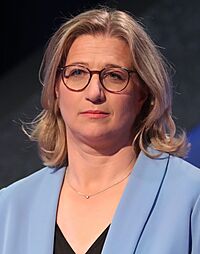President of the German Bundesrat facts for kids
Quick facts for kids President of theFederal Council of the Federal Republic of Germany |
|
|---|---|

|
|
| Legislative Branch of the German Federal Government |
|
| Seat | Berlin, Germany |
| Appointer | Bundesrat of Germany |
| Term length | One year |
| Constituting instrument | German Basic Law |
| Inaugural holder | Karl Arnold |
| Formation | 1949 |
| Website | Official Website: http://www.bundesrat.de/EN/organisation-en/praesident-en/praesident-en-node.html |
In Germany, the President of the Bundesrat (also called the President of the Federal Council) is the leader of the Bundesrat. The Bundesrat is like a second parliament in Germany, where representatives from Germany's 16 states work together. The President of the Bundesrat is chosen by the Bundesrat members for a one-year term. This term usually runs from November 1st to October 31st of the next year.
Usually, the job of President rotates among the leaders of the 16 state governments. This is a long-standing tradition. However, the Bundesrat can choose any member they want. A president could even be chosen again, which has happened once before. Besides leading the Bundesrat, the President also acts as a stand-in for the Federal President if needed. This makes the role very important in Germany. Also, the main celebration for German Unity Day is often held in the state whose leader is the current President of the Bundesrat.
The President of the Bundesrat is in charge of organizing and leading the meetings. They also officially represent the Bundesrat. Two Vice Presidents help the President. They give advice and take over if the President is away. These three people together form the leadership team of the Bundesrat.
The current President of the Bundesrat is Anke Rehlinger. She is the leader of the state of Saarland. Her one-year term began on November 1, 2024.
How the President is Chosen
Germany's main law, called the Basic Law, simply says that "the Bundesrat elects its President for one year." To be elected, a person needs more than half of the votes from the Bundesrat members. Currently, that means 35 out of 69 votes.
In reality, the position moves from one state to another in a fair way. This is based on a special agreement called the "Königstein agreement." The job rotates among the states based on their population. The state with the most people gets the presidency first, then the next most populated, and so on. Even though any member from the chosen state could be elected, it's always the Minister-President (the state leader) who gets the job. The order of states is updated after each full rotation, using the latest population numbers.
Here is the current order of states for the Bundesrat presidency:
- North Rhine-Westphalia
- Bavaria
- Baden-Württemberg
- Lower Saxony
- Hesse
- Saxony
- Rhineland-Palatinate
- Berlin
- Schleswig-Holstein
- Brandenburg
- Saxony-Anhalt
- Thuringia
- Hamburg
- Mecklenburg-Vorpommern
- Saarland
- Bremen
The Königstein agreement also says that if the President of the Bundesrat leaves their job as Minister-President (for example, by losing an election or resigning), the new Minister-President of that state takes over. They only finish the rest of the original one-year term. This happened in April 1999. Hans Eichel, who was President of the Bundesrat and Minister-President of Hesse, lost his state election. So, Roland Koch became the new Minister-President and finished Eichel's term until October 1999.
Standing in for the Federal President
Article 57 of the Basic Law explains an important duty: "If the Federal President is unable to perform his duties, or if his office falls prematurely vacant, the President of the Bundesrat shall exercise his powers."
This means if the Federal President cannot do their job, or if the position becomes empty, the President of the Bundesrat steps in as the acting President. When this happens, they temporarily stop leading the Bundesrat meetings. If the Federal President resigns, passes away, or is removed from office, a new Federal President is chosen within 30 days.
Three Presidents of the Bundesrat have served as acting Federal Presidents:
- Karl Arnold: He was acting President for only six days in September 1949. This was after he was elected President of the Bundesrat and before Theodor Heuss became the first official President of Germany. He is the shortest-serving head of state in German history.
- Jens Böhrnsen: He served from May 31, 2010, to June 30, 2010. This was after Horst Köhler resigned and before Christian Wulff was elected.
- Horst Seehofer: He served from February 17, 2012, to March 18, 2012. This was after Christian Wulff resigned and before Joachim Gauck was elected.
If the Federal President travels to another country for a state visit, the President of the Bundesrat does not take over all their duties. Instead, they can "deputize" for the Federal President. This means they can do tasks that require the Federal President to be physically present, like signing important documents.
See also
 In Spanish: Presidente del Bundesrat alemán para niños
In Spanish: Presidente del Bundesrat alemán para niños
 | Madam C. J. Walker |
 | Janet Emerson Bashen |
 | Annie Turnbo Malone |
 | Maggie L. Walker |


